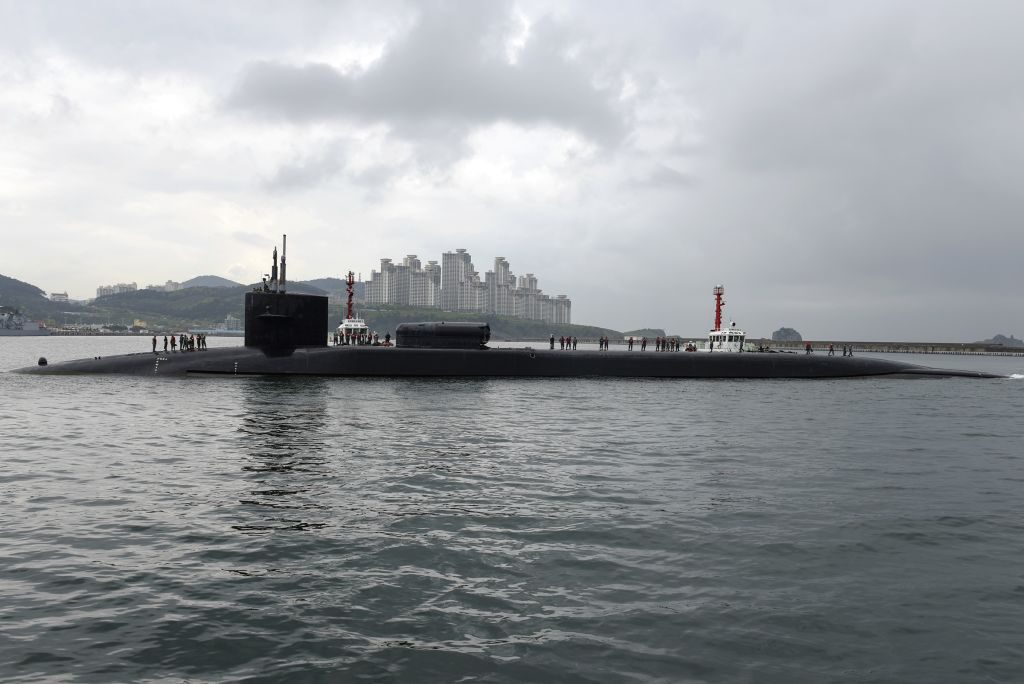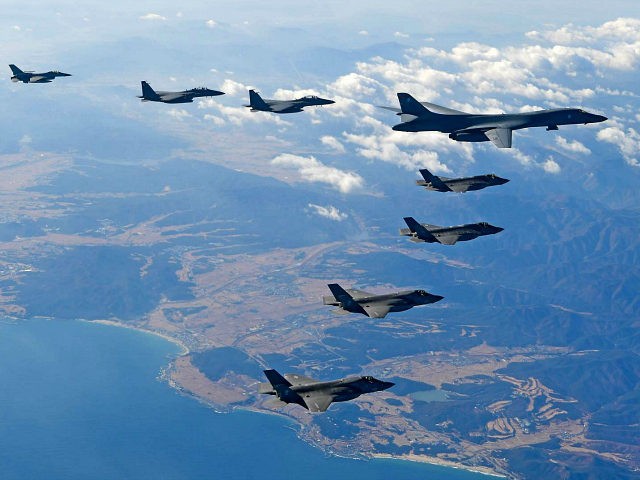Communist North Korea threatened on Monday to shoot down U.S. Air Force planes in response to the docking of a nuclear-capable submarine in South Korea, the result of an agreement between leftist American President Joe Biden and his South Korean counterpart, Yoon Suk-yeol, in April.
Seoul and Washington confirmed the arrival of the USS Michigan, a nuclear-powered submarine, to the southern port city of Busan on June 15, an agreement that formed part of the Washington Declaration, a document published by both governments during Yoon’s visit to the American capital in April. The submarine’s presence was a form of deployment unseen since the 1980s and apparently an American response to growing anxiety about North Korea’s illicit nuclear program in South Korea, which has spawned high levels of support among citizens for Seoul to develop its own nuclear weapons independent of America.
The communist regime of North Korea ended 2022 with dictator Kim Jong-un demanding his military engage in an “exponential increase of the country’s nuclear arsenal” after not staging a nuclear weapons test for five years. The response in South Korea was one of alarm, increasing support for nuclear weapons development. A poll published in February by the Chicago Council on Global Affairs found that 71 percent of South Koreans supported a native nuclear weapons program. A month prior, Yoon said in an interview, “the Republic of Korea [South Korea] could deploy tactical nuclear weapons or possess its own nukes.”
The North Korean Defense Ministry omitted any mention of Kim’s vow to greatly increase the number of nuclear weapons at Pyongyang’s disposal in its condemnation of the arrival of the USS Michigan, instead calling the presence of the marine vehicle “the most undisguised nuclear blackmail” and a “grave threat and challenge to the regional and global peace and security.” The statement predicted that the submarine would “incite the worst crisis of nuclear conflict in practice.”
In an official statement, the Ministry went on to condemn the introduction of the submarine to the region as the latest in a series of allegedly inflammatory actions, including, allegedly, “massively introducing air reconnaissance assets into the Korean peninsula, where there exist [sic] a constant possibility of military conflict and the danger of a nuclear war is growing more serious.” It did not explicitly connect the alleged spy planes to its criticism of the deployment of the USS Michigan, aside from claiming that, together, all of America’s alleged provocations indicate a desire to trigger a massive military conflict.

File/In this handout photo provided by the U.S. Navy, the guided-missile submarine USS Michigan arrives on April 25, 2017 in Busan, South Korea. The USS Michigan is in South Korea for a scheduled port visit while conducting routine patrols throughout the western Pacific. (USN Mass Communication Specialist 2nd Class Jermaine Ralliford via Getty Images)
“It is as clear as noonday what danger will be entailed by the fact that the enemy side’s spy planes are coming nearer to the territorial sky of its belligerent party in the Korean peninsula,” the statement read, “where huge armed forces and nuclear weapons are standing in confrontation with each other.”
“It is a clear threat to the sovereignty of the DPRK [North Korea] and a grave provocation plunging the regional situation into an irretrievable phase,” the North Korean government claimed.
In response, the extensive complaint continued, North Korea would make America “pay a dear price.”
“There is no guarantee that such shocking accident as downing of the U.S. Air Force strategic reconnaissance plane will not happen in the East Sea of Korea,” it concluded.
In response to the statement on Monday, the South Korean government denied the existence of any American aerial reconnaissance missions into North Korea.
“Flight by U.S. reconnaissance assets around the Korean Peninsula is a normal reconnaissance activity, and North Korea’s claim that its airspace has been violated is not true,” the Joint Chiefs of Staff of South Korea clarified in a statement, according to the Korea JoongAng Daily. “We strongly urge the North to stop creating tensions by way of these false claims.”
The South Korean newspaper noted that Yoon is departing this week to attend the NATO summit in Vilnius, Lithuania, this week as an invited guest. Yoon is expected to attend alongside Japanese Prime Minister Kishida Fumio, outraging both North Korea and its closest ally, communist China. In an interview with the Associated Press on Monday, Yoon said that he would discuss the threat of North Korea’s nuclear program at the summit.
“Now is the time to clearly demonstrate that the international community’s determination to deter North Korea’s nuclear weapons program is stronger than North Korea’s desire to develop nuclear weapons,” Yoon asserted.
“Peace is never as certain and reliable as when it is backed by powerful force and deterrence,” he continued. “Strong international sanctions against North Korea have the effect of preventing the advancement of its nuclear and missile capabilities.”
Yoon, a conservative, has pursued a much more forceful policy against North Korea than his predecessor, Moon Jae-in, a leftist who repeatedly visited North Korea for meetings with Kim. Moon made history in September 2018 by climbing Mount Paektu, a volcano considered sacred in Korean mythology, alongside Kim and his wife. Moon’s policy did not result in any meaningful policy changes between the Koreas; in 2020, North Korea bombed a joint liaison office in Kaesong that Moon had established in 2018 to increase communication.

COMMENTS
Please let us know if you're having issues with commenting.